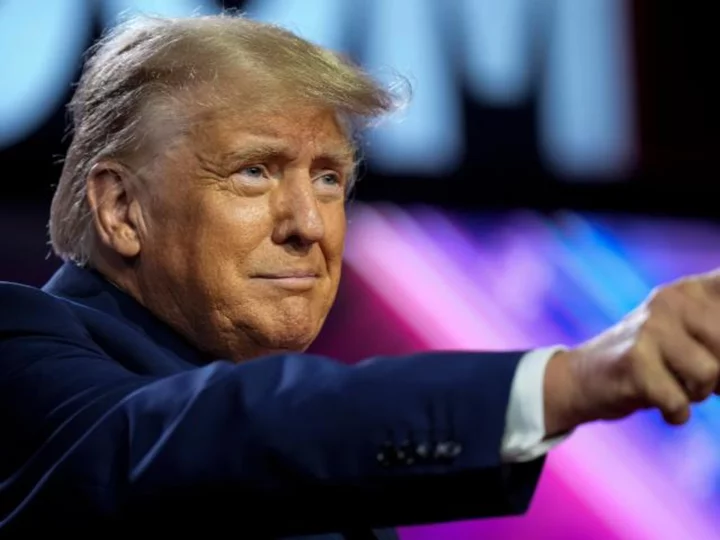The Justice Department has taken an unusual step in court to try to protect former President Donald Trump from testifying under oath in a lawsuit from former FBI officials Peter Strzok and Lisa Page.
Lawyers from the federal agency are asking the federal appeals court in Washington, DC, to block an upcoming deposition of Trump, according to a new court filing on Tuesday.
The DOJ has gone to the appeals court to try to correct what it believes was a mistake from a lower court, when Judge Amy Berman Jackson decided Trump could be deposed by Strzok's and Page's legal teams about Strzok being fired following his work on the Russia investigation.
The Justice Department has had to navigate the complicated law around possible protections for Trump for what he said and did during his presidency in a number of cases. Also on Tuesday, in a separate lawsuit, the DOJ said it no longer believes Trump should be immune in a 2019 defamation accusation from columnist E. Jean Carroll.
In the 2019 lawsuit, Strzok alleges Trump's political vendetta against him prompted the FBI to terminate him unjustly, though former Trump administration officials have said Strzok wasn't fired because of the then-President Trump.
The Justice Department has persistently tried to use position as president in the effort to shield him.
"Only the most extraordinary of circumstances would justify allowing a plaintiff to depose a former high-level official about actions he took in the course of his official duties. This case falls far short of that standard," lawyers for the Justice Department wrote to the DC Circuit Court of Appeals on Tuesday.
"That this case involves the deposition of a former President, rather than a sitting President, does not diminish the separation-of-powers concerns," the lawyers added. "The district court committed a clear abuse of discretion in authorizing Strzok to depose the former President."
It is unusual for a party in a lawsuit to try for an appeal in this way at this stage of the case -- and an even more unusual step for the Justice Department to take.
The approach the DOJ is taking essentially alleges to the DC Circuit Court of Appeals that Jackson got the law wrong. And no matter what the appeals court decides in the dispute over Trump's deposition, Jackson still will be handling the larger case between Strzok and the administration.
Jackson wrote in her order last week: "The fact remains that the former President himself has publicly boasted of his involvement." Her order was the second time she refused to block Trump's deposition, as the DOJ requested, "given the limited nature of the deposition that has been ordered, and the fact that the former President's schedule appears to be able to accommodate other civil litigation that he has initiated."
Before Strzok's firing, then-President Trump tweeted repeatedly about Strzok and Page in a negative way, saying the FBI should fire Strzok.
The Justice Department on Tuesday also argued to the appeals court that Trump shouldn't have to sit for a deposition because "Strzok hardly needs to confirm whether the President expressed the same views in meetings in the Oval Office that he expressed publicly."
Strzok and Page have been trying to schedule Trump's deposition for the coming weeks, the DOJ added. Jackson had said he could be asked a narrow set of questions in a two-hour deposition.
DOJ has argued Trump's under oath testimony isn't needed in the case because FBI Director Chris Wray, Trump's former White House chief of staff John Kelly and others had already testified about the decision to fire Strzok.
However, Kelly, in a sworn declaration made public in court last week, said Trump questioned him and others in 2018 about whether Strzok and Page "could be disciplined."
"It appeared from President Trump's comments, both public and private, that he wanted to see Mr. Strzok fired," Kelly wrote.
Kelly also described Trump asking about other possible retaliatory actions the federal government could take.
"President Trump questioned whether investigations by the Internal Revenue Service or other federal agencies should be undertaken into Mr. Strzok and/or Ms. Page. I do not know of President Trump ordering such an investigation. It appeared, however, that he wanted to see Mr. Strzok and Ms. Page investigated," Kelly wrote. "President Trump also questioned whether Mr. Strzok and Ms. Page should have their security clearances revoked."
Trump faces several lawsuits at this time.
He's also being sued by members of Congress and Capitol Police officers who are trying to hold him responsible for the violence of the crowd on January 6. In that lawsuit, the DOJ has refused to say he should be protected because he was president at the time, saying that inciting violence wouldn't have been part of his official duties.
The appeals court in DC is currently weighing Trump's immunity claim in that case.

